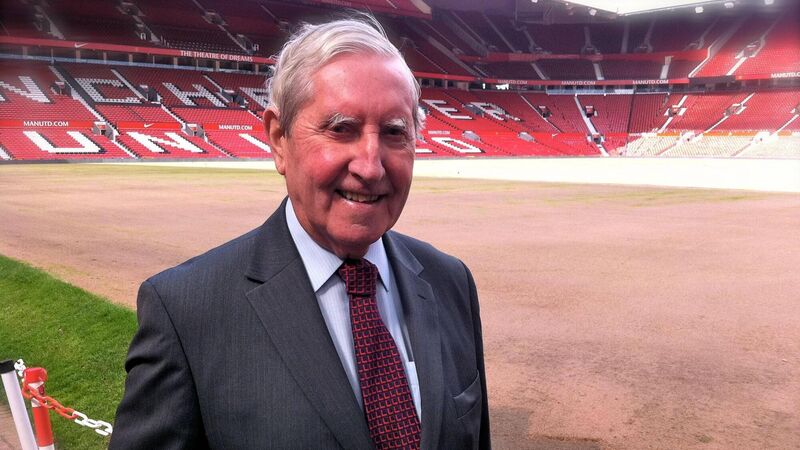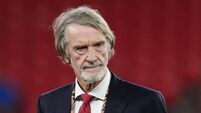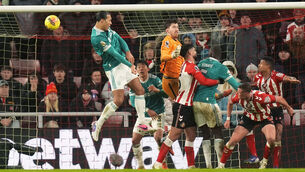Rebel spirit unites Frank O’Farrell and Roy Keane

Frank O'Farrell at Old Trafford years after his sacking.
What was it about Corkmen standing up to Scottish legends at Manchester United?
Roy Keane’s bust-up with Alex Ferguson in 2005, witnessed by team-mates and staff, soon led to the captain’s swift exit but 36 years earlier his fellow Leesider Frank O’Farrell also took a principled stance against a revered knight at Old Trafford, Alex Ferguson.
Arguably, the decision by O’Farrell – who died on Sunday at the age of 95 – was braver.
Keane was well aware that his days as United’s powerhouse were numbered by the age of 34.
After 13 years riding the crest of the most successful period in United’s history, a succession of injuries, particularly an ongoing hip problem, rendered him dispensable.
He knew what was coming. The backlash from his MUTV critique, escalating into some home truths aimed at Fergie and his assistant Carlos Queiroz, brought nagging friction to the point of no return. There was only going to be one winner. “Players are pieces of meat – that’s how I look at it,” Keane reflected afterwards. “When your time is up, it’s up.”
No room for sentiment, unlike O’Farrell’s initial dealings with United. He was the chosen one to succeed Busby, constantly reminded that he was handpicked by the great man himself. Granted, Wilf McGuinness initially filled the void created by the Scot calling time after 25 years but he was a former player of Busby’s. United’s attempt at establishing a bootroom institution to mimic the version underway at deadly rivals Liverpool fell flat at the first attempt.
An outsider was turned to and O’Farrell’s strides at Leicester City were recognised in 1971 with the offer to lead the biggest club in England, who just three earlier had become the first domestic team to lift the coveted European Cup.
It wasn’t so much a management job but a revival project. That was reflected in the five-year contract tabled.
And, in contrast to Keane’s demise, the aspiring train driver from his days living in Turner’s Cross couldn’t have imagined what was looming down the tracks.
For all the highs the giant of Irish football enjoyed during a career that spanned almost a half century, he will be forever linked to his short spell in charge at United.
The malaise at United, it must be recalled, was well underway when the man originally from Blackpool in Cork accepted Busby’s invitation.
Busby’s European Cup winning team of 1968 had slumped to an 11th place finish in the then First Division the following season, marginally improving by three places for the campaign preceding O’Farrell’s appointment.
An ageing backbone to their decorated side was apparent in his only full season and he the task of transfusing a team was bound to put noses out of joint.
His critics cite a too much, too soon charge in terms of squad overhaul. George Best was suspended and Bobby Charlton dropped – tension between the duo landing on the manager’s lap.
When Charlton complained to O’Farrell at half-time about Best deviating from a rehearsed set-piece routine, he hurled the grievance back at the captain to resolve on the pitch. Once the new sheriff wasn’t entertaining such frivolity, the old guard diverted their whining to Busby.
He wasn’t going quietly, switching to board member and the unofficial sounding board for his core of stalwarts.
O’Farrell was his own man and the emergence of what he branded interference from Busby was anathema to his principles.
From his first day on the job, when he darkened the jovial atmosphere by rightly demanding the managerial office still occupied by the doyen, to pulling him up for cribbing to his wife Ann about Charlton’s axing, the Rebel streak was undimmed.
Similar to Keane’s importance in Ferguson’s side, however, O’Farrell realised his moral code was only as good as his results.
Season one’s eight-placed finish following an early surge to the top of the table was accepted but any long-term vision was binned midway through the following campaign when they slipped into the relegation zone.
According to the Leesider, the man who had publicly declared him as his best-ever signing couldn’t look him in the eye during the crisis talks, leaving Chairman Louis Edwards to announce the parting.
O’Farrell was soured to such an extent by his sacking in December 1972 that it wasn’t until 40 years later that he decided to take up an offer of a return to Old Trafford. His conviction uncompromised, he held the opinion right up to his passing that United, especially Busby, had treated him shabbily.
His stint at United wasn’t the only occasion O’Farrell held firm against a seemingly immovable force. While on Ireland duty in 1955 on a tour of Norway and Germany, he supported Peter Fallon’s position on players' rights from the FAI. In lieu of the £2 daily pocket money that went unpaid, Fallon kept his green jersey. It cost him dearly by being exiled and O’Farrell wasn’t spared retribution either; picked just four more times for his country.
A couple of generations on and Keane is relevant to United, albeit indirectly.
It is his words as a Sky Sports pundit that are sacred to the club’s fanbase, not to be confused with reminiscing about his glory days.
Rather than resort to the lazy soundbite of inferior quality, Keane attributes the team’s troubles to more inherent deficits among the players like leadership, bravery, and workrate. His comments resonate across the supporter pool, highlighting the cultural slide underpinning the rap sheet.
Neither party was interested in O’Farrell securing redemption at United – the experience shying him away from the English top-flight as a whole – yet Keane has never closed the door on a return.
His CV so far wouldn’t get him onto the managerial shortlist but don’t dismiss the involvement of the energetic 50-year-old at some stage in restoring their traditional values. Heaven knows, in the week of O’Farrell’s death, how United could do with a dose of Rebel spirit.
Pent-up demand for live football and the restoration of full capacities has augmented an exciting start to the League of Ireland seasons but the spectre of poor pitch condition and unruly crowd behaviour are unwelcome returns.
Regarding the surfaces, the Showgrounds was never regarded as pristine but Saturday’s meeting between two sides renowned for style, Sligo and Dundalk, was ruined by the underfoot terrain.
“The surface was rubbish,” blasted Dundalk boss Stephen O’Donnell afterwards. “I just hope no neutrals attended because they won’t be coming back.” His counterpart Liam Buckley didn’t sugarcoat the dire state either.
At Tolka Park 24 hours earlier, Damien Duff was jokingly pleading for the “Save Tolka Park Pitch” rather than stadium. Both his Shelbourne side and leaders Derry City struggled for fluency. Treaty United, in the First Division, have had their problems with Markets Field too.
Fans of some clubs, meanwhile, are attracting unnecessary fines for use of flares and pyrotechnics. Shamrock Rovers have shipped fines of €6,000, marginally dodging a stadium ban, while others including Cork City, Galway United and Waterford have also been ordered to cough up for misdemeanors.
Threatening those found guilty of such charges with expulsion seems the only deterrent. The move would likely to be endorsed by the real fans craving for a safe matchday experience.
While Stephen Kenny’s contract extension was a formality, the identity of the man he’ll ultimately report to is far less straightforward.
The FAI late last year created the new role of Football Director to succeed the High-Performance post Ruud Dokter held for seven years, bizarrely swelling the remit.
Apart from trying to fuse the competing factions – or at least broker peace – their bread and butter will be creating an environment for the senior Ireland teams to prosper.
Interest in a post of this stature was inevitably fierce and the recruitment process is well underway.
Speculation about contenders has been rife, with Niall O’Regan, Will Clarke and Jim Crawford understood to be among the internal candidates.
Still, chief executive Jonathan Hill and High-Performance Chairman Packie Bonner could be inclined to seek a fresh face. The credentials of Curtis Fleming, as espoused in this column, are undeniable while his ex-St Patrick’s Athletic team-mate Pat Fenlon possesses a track record rich in the key aspects of the game.
Former Ireland U17 manager John Morling is on the market after being surprisingly relieved of his Academy Director’s post recently at Brighton and Hove Albion, where several Irish graduates, including Evan Ferguson, emerged. However, a reunion with Dan Ashworth at moneybags Newcastle United is an attractive alternative.
Back on the domestic front and a couple of other former Ireland players have been spoken of favourably. Keith Andrews has worked among the younger age-groups before assisting Kenny with the Under-21s and seniors. The second is John O’Shea, who needs no introduction. Watch this space.











